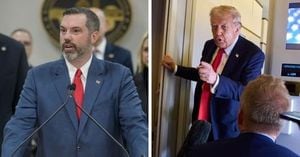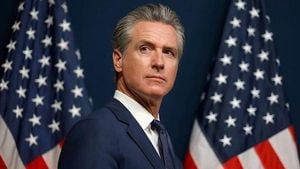Ghana's government is inching closer to resolving its debt restructuring challenges, with recent reports indicating significant progress. Currently, only seven percent of its external debt remains unresolved, primarily involving negotiations with commercial creditors. This phase of the restructuring is considered complex, as it requires the government to engage with about 60 different institutions, each holding unique debt terms.
Finance Minister Dr. Cassiel Ato Baah Forson stated during a media briefing about Ghana's Memorandum of Understanding (MoU) with the Official Creditor Committee (OCC) the government's commitment to expedite discussions with these commercial entities. He highlighted the complexity of this final segment, noting, "Although this seven percent may seem small, it presents a complex challenge. Each engagement will need to be handled separately." The remaining debt portion amounts to approximately $2.7 billion and involves numerous international banks, distinguishing this round from previous engagements with bondholders and official creditors, which can be grouped for streamlined negotiations.
To date, significant strides have been made within Ghana’s debt reform framework. This restructuring is part of broader efforts to restore economic stability under the International Monetary Fund (IMF) programme, which Ghana entered under previous leadership. The agreement aims to reduce the debt-to-GDP ratio below 55% by 2028 and keep the debt service-to-revenue ratio from exceeding 18% starting from then.
The Institute of Economic Affairs (IEA), a public policy think tank, has raised alarms over the potential for future debt restructurings, urging the government to focus on raising revenues and practicing fiscal responsibility. According to their bi-monthly Economic Outlook for November to December 2024, maintaining prudent expenditure is key to inspiring investor confidence as Ghana continues to implement the IMF's $3 billion Extended Credit Facility (ECF) programme.
"Moving along this path is necessary to avoid another painful debt restructuring, whilst engendering investor confidence in the economy," stated the IEA, particularly as the Ghanaian government navigates its budget for 2025. The Institute noted the government's intention to abolish several taxes, including the e-levy and various pandemic-related levies, which would ease the burden on the few households and businesses actively contributing to tax revenue.
Despite these tax cuts, concerns remain. The IEA indicated, "Resuming debt service will put pressure on the budget and the exchange rate," highlighting the importance of compensatory measures to mitigate the effects of external debt repayment. The think tank emphasized the need for increased tax intake and called for enhancing the natural resource sector to provide fiscal resources for development, accompanied by changes to ownership structures to maximize Ghana's benefits.
Dr. Forson also reiterated the government's focus on balancing revenue and expenditure as part of fulfilling IMF conditions, even detailing plans to generate additional tax revenue correlatively with GDP targets. During his recent visit to the Ghana Revenue Authority (GRA) and the Controller and Accountant-Generals Department (CAGD), he underscored the importance of their roles as the country navigates these economic challenges.
The overall goal of Ghana's debt restructuring is to lay the groundwork for sustainable fiscal health. Notably, the country successfully executed a domestic debt exchange programme last year, covering approximately GH¢203.4 billion. Various phases of the restructuring have already been executed, with recent advancements including the MoU signed with all 25 participating creditor countries.
Moving forward, the Ghanaian government is expected to announce timelines for engaging the banks involved and to continue working on finalizing the restructuring of this last portion of debt. Assuring fair treatment during these negotiations, Dr. Forson remarked on the application of the 'most favoured creditors' clause alongside principles ensuring comparability, which directs equitable terms across different creditors.
Ghana's restructuring plans are not just about balancing figures; they symbolize the nation's strategic pivot toward economic recovery and resilience. The Finance Minister's approach and the think tank's caution reflect broad consensus on the need for sustainable fiscal management and the potential of the country's natural resources to support its economic aspirations.
With the nation’s financial stability on the line, all eyes are on the government and its ability to execute these plans effectively, hoping to herald new growth and regain the confidence of investors as they navigate this complex web of negotiations.



